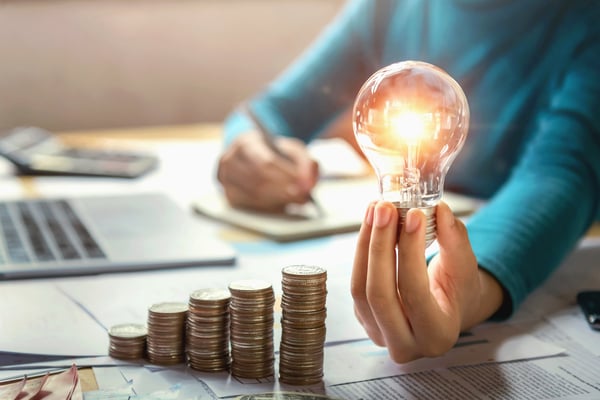If you want to lower your utility bills, take some sage advice from spy movies—“Follow the money.”
Leaky windows translate into a leaky wallet. Poor insulation translates into piles of cash going up in smoke. The good news? It’s never too late to find ways to reduce your energy consumption. Begin by following the money.

The Energy You Consume and the Money YOu SPend
Whether you add energy to the energy grid or take energy from it, your wallet at the end of each month tells one of these energy-consumption stories:
- You use more energy than you produce. You import energy from external sources and pay for it. Your monthly utility bill tells the story of money leaving your hands.
- You use the same amount of energy that you produce, likely with the help of renewable energy. This is called “net-zero.” You’ve found a sweet spot where you enjoy more money in your pocket at the end of each month.
- You use less energy than you produce. You’ve joined that elite “net-positive” group who meet their own needs with renewable energy and have energy to spare. Depending on where you live, you may receive a check or credit for energy you export back to the grid.
How Can My Family Reduce Energy Consumption and Save Money?
Moving to net-zero is a great goal. Various factors will influence that journey, like your home’s current energy efficiency, its geographic location, and your budget. Here’s the most important thing to remember: Whatever your starting point, you can move forward.
Beginning Steps
- Invest in a professional energy audit or DIY assessment to identify areas of waste in your home. You’ll probably focus on insulation, windows, and appliances.
- Install energy-efficient lighting. Trade all incandescent bulbs for energy-efficient LED or CFL bulbs.
- Seal and insulate. Add weather stripping to reduce drafts in windows and doors and consider adding insulation to your attic and basement.
- Replace old and inefficient appliances with ENERGY STAR-rated models. You can do this gradually.
- Install a programmable thermostat to optimize heating and cooling efficiency.
Intermediate Steps
- Invest in renewable energy. Install a solar photovoltaic (PV) system on your roof or property. Size it according to your energy needs and budget.*
- Add an energy storage system (battery) to store the excess energy that your renewable system generates. You can use this energy on cloudy days or at night.
- Install a high-efficiency HVAC system. For the greatest efficiency, choose a geothermal system.
- Invest in energy-efficient windows. This takes care of drafts and reduces your heating and cooling loads.
- Improve your water efficiency. Install low-flow fixtures and a tankless water heater. When it comes to savings on hot water, know the hot-water benefits of geothermal heating and cooling, #3 above.
*If you plan on adding solar panels and geothermal heating and cooling, install the geothermal system first. This will reduce the number of solar panels you need.
Advanced Steps
- Install an energy monitoring system that tracks the energy you use in real-time and automates actions that save energy.
- Use smart home technologies. Optimize energy use with smart thermostats, lighting controls, and occupancy sensors.
- Install a heat pump water heater that preheats water during the day when power is cheaper and stores it for later use during more costly hours. Heat pump water heaters also have longer life spans than conventional water heaters.
- Explore feed-in tariff systems for delivering energy back to the grid. The U.S. Energy Information Administration’s website provides state-by-state details.
INSPIRATION FOR STARTING YOUR NET-ZERO JOURNEY
Visit these net-zero homes for inspiration on how you can make the most of your net-zero journey and save: Ohm Sweet Ohm, Southern Illinois Lake House, St. Augusta Home. Curious? Contact Enertech today.


